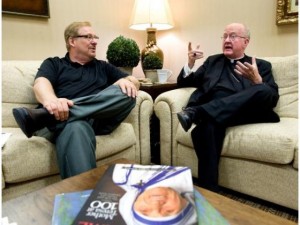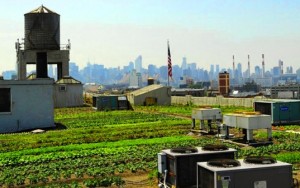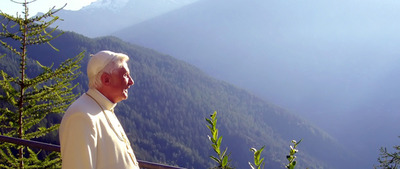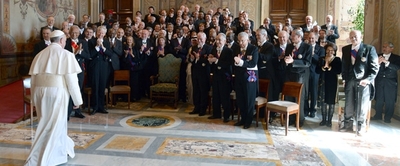November 17, 2014
Among many speeches yesterday following Pope Francis’s address to the Humanum colloquium on complementarity, that of Lord Jonathan Sacks, the former Chief Rabbi of the United Kingdom, was the standout, bringing the audience of 300 in the synod hall to their feet. Using dazzling oratory, he offered a magisterial account of the development of marriage from the very start — a sexual act between fish in Scotland — right up to the present day, told by means of seven stories, and ending with a spectacular exegesis of the Genesis account. It is a story with a tragic end: the dismantling of what he calls “the single most humanising institution in history” resulting in a whole new era of poverty and social division. Yet the recovery of that institution offers hope. The full speech follows.
I want this morning to begin our conversation by one way of telling the story of the most beautiful idea in the history of civilization: the idea of the love that brings new life into the world. There are of course many ways of telling the story, and this is just one. But to me it is a story of seven key moments, each of them surprising and unexpected. The first, according to a report in the press on 20th October of this year, took place in a lake in Scotland 385 million years ago. It was then, according to this new discovery, that two fish came together to perform the first instance of sexual reproduction known to science. Until then all life had propagated itself asexually, by cell division, budding, fragmentation or parthenogenesis, all of which are far simpler and more economical than the division of life into male and female, each with a different role in creating and sustaining life.
When we consider, even in the animal kingdom, how much effort and energy the coming together of male and female takes, in terms of displays, courtship rituals, rivalries and violence, it is astonishing that sexual reproduction ever happened at all. Biologists are still not quite sure why it did. Some say to offer protection against parasites, or immunities against disease. Others say it’s simply that the meeting of opposites generates diversity. But one way or another, the fish in Scotland discovered something new and beautiful that’s been copied ever since by virtually all advanced forms of life. Life begins
when male and female meet and embrace.
The second unexpected development was the unique challenge posed to Homo sapiens by two factors: we stood upright, which constricted the female pelvis, and we had bigger brains – a 300 per cent increase – which meant larger heads. The result was that human babies had to be born more prematurely than any other species, and so needed parental protection for much longer. This made parenting more demanding among humans than any other species, the work of two people rather than one. Hence the very rare phenomenon among mammals, of pair bonding, unlike other species where the male contribution tends to end with the act of impregnation. Among most primates, fathers don’t even recognise their children let alone care for them. Elsewhere in the animal kingdom motherhood is almost universal but fatherhood is rare.
So what emerged along with the human person was the union of the biological mother and father to care for their child. Thus far nature, but then came culture, and the third surprise.
It seems that among hunter gatherers, pair bonding was the norm. Then came agriculture, and economic surplus, and cities and civilisation, and for the first time sharp inequalities began to emerge between rich and poor, powerful and powerless. The great ziggurats of Mesopotamia and pyramids of ancient Egypt, with their broad base and narrow top, were monumental statements in stone of a hierarchical society in which the few had power over the many. And the most obvious expression of power among alpha males whether human or primate, is to dominate access to fertile women and thus maximise the handing on of your genes to the next generation. Hence polygamy, which exists in 95 per cent of mammal species and 75 per cent of cultures known to anthropology. Polygamy is the ultimate expression of inequality because it means that many males never get the chance to have a wife and child. And sexual envy has been, throughout history, among animals as well as humans, a prime driver of violence.
That is what makes the first chapter of Genesis so revolutionary with its statement that every human being, regardless of class, colour, culture or creed, is in the image and likeness of God himself. We know that in the ancient world it was rulers, kings, emperors and pharaohs who were held to be in the image of God. So what Genesis was saying was that we are all royalty. We each have equal dignity in the kingdom of faith under the sovereignty of God.
From this it follows that we each have an equal right to form a marriage and have children, which is why, regardless of how we read the story of Adam and Eve – and there are differences between Jewish and Christian readings – the norm presupposed by that story is: one woman, one man. Or as the Bible itself says: “That is why a man leaves his father and mother and is united to his wife, and they become one flesh.”
Monogamy did not immediately become the norm, even within the world of the Bible. But many of its most famous stories, about the tension between Sarah and Hagar, or Leah and Rachel and their children, or David and Bathsheba, or Solomon’s many wives, are all critiques that point the way to monogamy.
And there is a deep connection between monotheism and monogamy, just as there is, in the opposite direction, between idolatry and adultery. Monotheism and monogamy are about the all-embracing relationship between I and Thou, myself and one other, be it a human, or the divine, Other.
What makes the emergence of monogamy unusual is that it is normally the case that the values of a society are those imposed on it by the ruling class. And the ruling class in any hierarchical society stands to gain from promiscuity and polygamy, both of which multiply the chances of my genes being handed on to the next generation. From monogamy the rich and powerful lose and the poor and powerless gain. So the return of monogamy goes against the normal grain of social change and was a real triumph for the equal dignity of all. Every bride and every groom are royalty; every home a palace when furnished with love.
The fourth remarkable development was the way this transformed the moral life. We’ve all become familiar with the work of evolutionary biologists using computer simulations and the iterated prisoners’ dilemma to explain why reciprocal altruism exists among all social animals. We behave to others as we would wish them to behave to us, and we respond to them as they respond to us. As C S Lewis pointed out in his book The Abolition of Man, reciprocity is the Golden Rule shared by all the great civilizations.
What was new and remarkable in the Hebrew Bible was the idea that love, not just fairness, is the driving principle of the moral life. Three loves. “Love the Lord your God with all your heart, all your soul and all your might.” “Love your neighbour as
yourself.” And, repeated no less than 36 times in the Mosaic books, “Love the stranger because you know what it feels like to be a stranger.” Or to put it another way: just as God created the natural world in love and forgiveness, so we are charged with creating the social world in love and forgiveness. And that love is a flame lit in marriage and the family. Morality is the love between husband and wife, parent and child, extended outward to the world.
The fifth development shaped the entire structure of Jewish experience. In ancient Israel an originally secular form of agreement, called a covenant, was taken and transformed into a new way of thinking about the relationship between God and
humanity, in the case of Noah, and between God and a people in the case of Abraham and later the Israelites at Mount Sinai. A covenant is like a marriage. It is a mutual pledge of loyalty and trust between two or more people, each respecting the dignity and integrity of the other, to work together to achieve together what neither can achieve alone. And there is one thing even God cannot achieve alone, which is to live within the human heart. That needs us.
So the Hebrew word emunah, wrongly translated as faith, really means faithfulness, fidelity, loyalty, steadfastness, not walking away even when the going gets tough, trusting the other and honouring the other’s trust in us. What covenant did, and we see this in almost all the prophets, was to understand the relationship between us and God in terms of the relationship between bride and groom, wife and husband. Love thus became not only the basis of morality but also of theology. In Judaism faith is a marriage. Rarely was this more beautifully stated than by Hosea when he said in the name of God:
I will betroth you to me forever;
I will betroth you in righteousness and justice, love and compassion.
I will betroth you in faithfulness, and you will know the Lord.
Jewish men say those words every weekday morning as we wind the strap of our tefillin around our finger like a wedding ring. Each morning we renew our marriage with God.
This led to a sixth and quite subtle idea that truth, beauty, goodness, and life itself, do not exist in any one person or entity but in the “between,” what Martin Buber called Das Zwischenmenschliche, the interpersonal, the counterpoint of speaking and
listening, giving and receiving. Throughout the Hebrew Bible and the rabbinic literature, the vehicle of truth is conversation. In revelation God speaks and asks us to listen. In prayer we speak and ask God to listen. There is never only one voice. In the Bible the prophets argue with God. In the Talmud rabbis argue with one another. In fact I sometimes think the reason God chose the Jewish people was because He loves a good argument. Judaism is a conversation scored for many voices, never more passionately than in the Song of Songs, a duet between a woman and a man, the beloved and her lover, that Rabbi Akiva called the holy of holies of religious literature.
The prophet Malachi calls the male priest the guardian of the law of truth. The
book of Proverbs says of the woman of worth that “the law of loving kindness is on her
tongue.” It is that conversation between male and female voices, between truth and love,
justice and mercy, law and forgiveness, that frames the spiritual life. In biblical times
each Jew had to give a half shekel to the Temple to remind us that we are only half.
There are some cultures that teach that we are nothing. There are others that teach that we are everything. The Jewish view is that we are half and we need to open ourselves to another if we are to become whole.
All this led to the seventh outcome, that in Judaism the home and the family
became the central setting of the life of faith. In the only verse in the Hebrew Bible to
explain why God chose Abraham, He says: “I have known him so that he will instruct
his children and his household after him to keep the way of the Lord by doing what is
right and just.” Abraham was chosen not to rule an empire, command an army, perform
miracles or deliver prophecies, but simply to be a parent. In one of the most famous lines in Judaism, which we say every day and night, Moses commands, “You shall teach these things repeatedly to your children, speaking of them when you sit in your house or when you walk on the way, when you lie down and when you rise up.” Parents are to be educators, education is the conversation between the generations, and the first school is the home.
So Jews became an intensely family oriented people, and it was this that saved us
from tragedy. After the destruction of the Second Temple in the year 70, Jews were
scattered throughout the world, everywhere a minority, everywhere without rights,
suffering some of the worst persecutions ever known by a people and yet Jews survived
because they never lost three things: their sense of family, their sense of community and
their faith.
And they were renewed every week especially on Shabbat, the day of rest when
we give our marriages and families what they most need and are most starved of in the
contemporary world, namely time. I once produced a television documentary for the
BBC on the state of family life in Britain, and I took the person who was then Britain’s
leading expert on child care, Penelope Leach, to a Jewish primary school on a Friday
morning.
There she saw the children enacting in advance what they would see that evening
around the family table. There were the five year old mother and father blessing the five
year old children with the five year old grandparents looking on. She was fascinated by
this whole institution, and she asked the children what they most enjoyed about the
Sabbath. One five year old boy turned to her and said, “It’s the only night of the week
when daddy doesn’t have to rush off.” As we walked away from the school when the
filming was over she turned to me and said, “Chief Rabbi, that Sabbath of yours is saving
their parents’ marriages.”
So that is one way of telling the story, a Jewish way, beginning with the birth of
sexual reproduction, then the unique demands of human parenting, then the eventual
triumph of monogamy as a fundamental statement of human equality, followed by the
way marriage shaped our vision of the moral and religious life as based on love and
covenant and faithfulness, even to the point of thinking of truth as a conversation
between lover and beloved. Marriage and the family are where faith finds its home and
where the Divine Presence lives in the love between husband and wife, parent and child.
What then has changed? Here’s one way of putting it. I wrote a book a few years
ago about religion and science and I summarised the difference between them in two
sentences. “Science takes things apart to see how they work. Religion puts things
together to see what they mean.” And that’s a way of thinking about culture also. Does it
put things together or does it take things apart?
What made the traditional family remarkable, a work of high religious art, is what it brought together: sexual drive, physical desire, friendship, companionship, emotional kinship and love, the begetting of children and their protection and care, their early education and induction into an identity and a history. Seldom has any institution woven together so many different drives and desires, roles and responsibilities. It made sense of the world and gave it a human face, the face of love.
For a whole variety of reasons, some to do with medical developments like birth control, in vitro fertilisation and other genetic interventions, some to do with moral change like the idea that we are free to do whatever we like so long as it does not harm
others, some to do with a transfer of responsibilities from the individual to the state, and other and more profound changes in the culture of the West, almost everything that marriage once brought together has now been split apart. Sex has been divorced from love, love from commitment, marriage from having children, and having children from responsibility for their care.
The result is that in Britain in 2012, 47.5 per cent of children were born outside marriage, expected to become a majority in 2016. Fewer people are marrying, those who are, are marrying later, and 42 per cent of marriages end in divorce. Nor is cohabitation a substitute for marriage. The average length of cohabitation in Britain and the United States is less than two years. The result is a sharp increase among young people of eating disorders, drug and alcohol abuse, stress related syndromes, depression and actual and attempted suicides. The collapse of marriage has created a new form of poverty concentrated among single parent families, and of these, the main burden is born by women, who in 2011 headed 92 per cent of single parent households. In Britain today more than a million children will grow up with no contact whatsoever with their fathers.
This is creating a divide within societies the like of which has not been seen since Disraeli spoke of “two nations” a century and a half ago. Those who are privileged to grow up in stable loving association with the two people who brought them into being will, on average, be healthier physically and emotionally. They will do better at school and at work. They will have more successful relationships, be happier and live longer.
And yes, there are many exceptions. But the injustice of it all cries out to heaven. It will go down in history as one of the tragic instances of what Friedrich Hayek called “the fatal conceit” that somehow we know better than the wisdom of the ages, and can defy the lessons of biology and history. No one surely wants to go back to the narrow prejudices of the past.
This week, in Britain, a new film opens, telling the story of one of the great minds of the twentieth century, Alan Turing, the Cambridge mathematician who laid the philosophical foundations of computing and artificial intelligence, and helped win the war by breaking the German naval code Enigma. After the war, Turing was arrested and tried for homosexual behaviour, underwent chemically induced castration, and died at the age of 41 by cyanide poisoning, thought by many to have committed suicide. That is a world to which we should never return.
But our compassion for those who choose to live differently should not inhibit us from being advocates for the single most humanising institution in history. The family, man, woman, and child, is not one lifestyle choice among many. It is the best means we have yet discovered for nurturing future generations and enabling children to grow in a matrix of stability and love. It is where we learn the delicate choreography of relationship and how to handle the inevitable conflicts within any human group. It is where we first take the risk of giving and receiving love. It is where one generation passes on its values to the next, ensuring the continuity of a civilization. For any society, the family is the crucible of its future, and for the sake of our children’s future, we must be its defenders.
Since this is a religious gathering, let me, if I may, end with a piece of biblical exegesis. The story of the first family, the first man and woman in the garden of Eden, is not generally regarded as a success. Whether or not we believe in original sin, it did not end happily. After many years of studying the text I want to suggest a different reading.
The story ends with three verses that seem to have no connection with one another. No sequence. No logic. In Genesis 3: 19 God says to the man: “By the sweat of your brow you will eat your food until you return to the ground, since from it you were
taken; for dust you are and to dust you will return.” Then in the next verse we read: “The man named his wife Eve, because she was the mother of all life.” And in the next, “The Lord God made garments of skin for Adam and his wife and clothed them.”
What is the connection here? Why did God telling the man that he was mortal lead him to give his wife a new name? And why did that act seem to change God’s attitude to both of them, so that He performed an act of tenderness, by making them
clothes, almost as if He had partially forgiven them? Let me also add that the Hebrew word for “skin” is almost indistinguishable from the Hebrew word for “light,” so that Rabbi Meir, the great sage of the early second century, read the text as saying that God made for them “garments of light.” What did he mean?
If we read the text carefully, we see that until now the first man had given his wife a purely generic name. He called her ishah, woman. Recall what he said when he first saw her: “This is now bone of my bones and flesh of my flesh; she shall be called woman for she was taken from man.” For him she was a type, not a person. He gave her a noun, not a name. What is more he defines her as a derivative of himself: something taken from man. She is not yet for him someone other, a person in her own
right. She is merely a kind of reflection of himself.
As long as the man thought he was immortal, he ultimately needed no one else. But now he knew he was mortal. He would one day die and return to dust. There was only one way in which something of him would live on after his death. That would be if he had a child. But he could not have a child on his own. For that he needed his wife. She alone could give birth. She alone could mitigate his mortality. And not because she was like him but precisely because she was unlike him. At that moment she ceased to be, for him, a type, and became a person in her own right. And a person has a proper name.
That is what he gave her: the name Chavah, “Eve,” meaning, “giver of life.”
At that moment, as they were about to leave Eden and face the world as we know it, a place of darkness, Adam gave his wife the first gift of love, a personal name. And at that moment, God responded to them both in love, and made them garments to
clothe their nakedness, or as Rabbi Meir put it, “garments of light.”
And so it has been ever since, that when a man and woman turn to one another in a bond of faithfulness, God robes them in garments of light, and we come as close as we will ever get to God himself, bringing new life into being, turning the prose of biology into the poetry of the human spirit, redeeming the darkness of the world by the radiance of love.
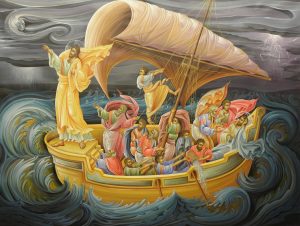 A prayer for those in the path of
A prayer for those in the path of